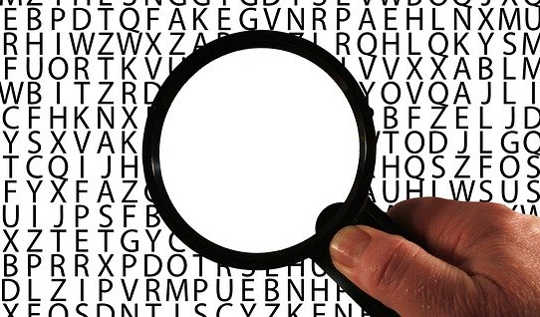
Image by Gerd Altmann
The way you talk to yourself and others directly impacts your behavior. Distinguishing wants from needs, using decisive language and eliminating indecisive language, and putting adjectives or feeling words and the word will back into your language assures you of having ease with the decluttering process. Changing your language will also improve your productivity and help you fulfill your goals before, during, and after the decluttering process.
I believe “I need” is the most overused phrase in our language. We say “I need” all the time: I need to get out of here; I need to pick up the kids; I need to call that guy; I need to do something with my hair; I need to exercise; I need new clothes; I need a new car. I need, I need, I need!
This phrase comes up often during the decluttering process. Someone holds up item after item and says, “I need this.” But the truth is, “I need” is a white lie. Saying you need something that is not an essential need instead of saying you “want” something or that you will “do” something is a way to avoid recognizing or admitting that you are making a choice, and it will disrupt you from remaining organized and productive.
We are in essence “needling” ourselves to death. Needling yourself to do things instead of willing yourself to do things is the barrier to follow-through. Needling is the cause of tension, worry, and nervousness.
Seven Essential Needs
I believe we only have seven essential needs: air, food, water, shelter, sleep, elimination, and sunlight. These are the seven things that keep us alive. Nothing else is a need.
In general, listen to others and keep track of how many times you hear people say some version of “I need,” such as “I must,” “I have to,” or “I gotta.” How often do these phrases pertain to the necessities that keep us alive?
More importantly, as you go through the decluttering process, listen to yourself and stop every time you hear yourself say, “I need this item.” Even when the item is used for one of the essential needs, rephrase to say, “I am choosing to keep this because...” Clarify why you’re making that choice; evaluate how it fits with your core values. Ask yourself: “Is it useful? Does it serve a purpose? Is it sentimental? Do I love it?”
For instance, we need food. But the kind of food we eat, and where and how we get it, is a choice. Most people shop for food in grocery stores, but you don’t need to. Some people grow their own food and hunt, while some people never cook, eating solely in restaurants.
You also don’t need to pay your taxes. Not paying them will not kill you, though eventually you will find yourself in serious trouble with the IRS. That won’t kill you either, but it can lead to financial disaster and legal challenges. For this reason, people usually choose to pay their taxes to avoid those negative consequences.
It’s Not Semantics
You can view this change to your language as semantics, but it’s not. When you deliberately make conscious choices — by saying “I want” or “I will” rather than “I need” — you emphasize the positive reasons, values, and motivations that are important to you. This helps keep you from feeling trapped by obligations.
For example, if you have children, you are regularly choosing how to care for them. You don’t “have” to buy them certain toys or pick them up from school if you don’t want to. They won’t die if you don’t buy them things or if you fail to show up. Of course, you want them to be happy and get home safely, yet there are other ways of achieving all that: fun activities instead of more stuff, earning their own money to buy things, taking a bus or public transit, sharing a ride with someone else, and walking or biking themselves. It is important to know that nothing you do is a “have to,” unless it is one of the seven actual needs.
Sometimes, admitting that you don’t want to do something will lead to clever solutions. Or perhaps, even though after-school pickups are an annoying chore, you will do it because you want to love and care for your kids. However, you also can decide that certain responsibilities and roles are incongruent with your ideal life, and even abhorrent, and you will choose not to do those things to pursue what you enjoy instead.
Once you rid yourself of “I need,” the freedom of life begins. You choose to fulfill your actual needs in numerous ways — in how you breathe, what you eat and drink, the home you live in, the clothing you wear, your sleep habits, how you care for the body, plus getting enough sun. Realizing that fulfilling your actual needs involves hundreds of choices, and that you’re in charge of making them, makes life a whole lot sweeter and more enjoyable.
Consciously choosing to declutter and get organized makes the process easier, too. Remember: You don’t “need” to get rid of anything, and you don’t “need” to keep anything. Make everything a choice that serves the larger purpose of your life.
Indecisive Language Versus Decisive Language
After “I need,” the most common phrase I hear when helping people get perpetually organized is “I’ll try”: I’ll try to get organized; I’ll try to finish this weekend; I’ll try to keep the kitchen and the house clean from now on; I’ll try not to buy so much stuff anymore. I call this type of impeding language “indecisive language.”
Indecisive language keeps you chained to your clutter. It makes decision-making impossible. Using decisive language helps you fulfill your dreams and goals. “I’ll try” or “I tried” signals indecision, doubt, resistance, reluctance, or fear. It expresses a lack of commitment or self-confidence.
If you hear yourself saying “I’ll try” as you go through this process, recognize this as expressing indecision about getting organized. Know that you either will or won’t accomplish your goals. Don’t “try” to succeed. Be decisive. Saying “I’ll try” indicates nonaction; it means nothing.
When people don’t finish something they set out to do, they often say “I tried” as a way to excuse themselves or escape blame. For instance, when someone misses an appointment, they say, “I tried to get to my doctor’s office today,” as if making the attempt is what’s important. It is a way to blame circumstances instead of taking responsibility for not following through on goals you set for yourself:
“I tried, but there was traffic,” “I lost track of time,” or “I took an important phone call.” Do those reasons matter? Not when it comes to following through and accomplishing tasks. The appointment was missed, and the person did not see the doctor. That someone “tried” does not change the outcome.
The same is true of decluttering and organizing your space. When you only get partway through the process and stop, your home will remain cluttered and disorganized, and most likely, any progress you make will be riddled with indecision. Again, this is more than semantics; the use of impeding language will jeopardize going forward toward a positive outcome.
In addition to “I’ll try,” listen for these other indecisive phrases: I might, I may, maybe, but, probably, perhaps, we’ll see, someday, sometime, somehow, if, could, should, possibly, not necessarily, and I’ll think about it. Finally, the two most popular indecisive words, which I hear constantly, are “kinda” and “sorta.”
You will improve organizational success by setting clear goals and committing to them. One thing that helps is specifying a time frame. Say, “I will get organized within the month.” Eliminating indecisive language will help you become more decisive about what to keep and what not to keep and what to do and what not to do.
When decluttering, some items can be put into the “projects” category. These are items you have uncertainty about, which you will work on down the road, and therefore they become “to dos.” Decisive language also helps you express how you feel, decisively.
Emotional Clarity: Identifying Your Feelings
The decluttering process is sometimes like pulling a rose bush out of the dirt with your bare hands. You will encounter thorns — in the form of prickly and uncomfortable feelings. In essence, in order to eliminate emotional clutter and successfully organize your space, you will want to pull out those thorns as you work. That means acknowledging emotions as they surface, correctly labeling and understanding them, and then healing any lingering hurt or pain.
One challenge people face during the decluttering process is that they are not familiar with their own feelings, in general. Serious clutter often occurs because someone is actively ignoring or avoiding certain difficult emotions or feelings stemming from past traumatic events. When this is the case, uncovering, understanding, and healing those emotions is part of the process.
Only you know what you feel. Only you can say when negative feelings are blocking you from moving ahead, what those feelings are, and where they come from. Others can help — by listening and providing support and insight — but they can’t do it for you.
This is the same as decluttering itself: Supportive people will help you carry and move stuff around, and offer advice about your space, but it’s up to you to decide what to keep, donate, gift, or sell and where to put everything, based on how often and where you use things. Ideally, the decluttering process will be a healing experience rather than a tenacious upheaval, and it will help you recognize and cope with any negative feelings that are keeping you from blossoming.
“How do I feel about the clutter?”
A good place to start is to ask yourself, “How do I feel about the clutter?” Ask yourself this question before you start, and ask it again during the process. As you do, see if your answer changes or becomes clearer.
You can feel hopeless or hopeful, discontent or excited, depending on how you view clutter and what you want to do about it. When questioned or pressured about clutter, you can feel upset and claim you “don’t care” about the clutter. How you answer that question will determine what you want to do to pull out any negative emotional thorns. When you say you don’t care about the clutter, that is apathy.
Sometimes when I ask people how they feel about their clutter, they are insulted and become defensive, claiming they “don’t care about getting organized.” They claim to be apathetic, which is a very common feeling and reaction today. But in my experience, when people answer by saying, “I don’t care,” that is the opposite of the truth. The mess represents a situation they care about very deeply, and their defensive stubbornness has become a stumbling block to fixing it.
Sometimes, people feign apathy to hide disappointment or shame over what they perceive as past failure. They are protecting themselves behind an “I don’t care” wall and are afraid of what will happen, and what they will feel, when they take it down. Indeed, their clutter has become a physical wall, and they resist removing it for the same reason they built their emotional wall — fear of being disappointed and hurt by their circumstances. Their emotions can in turn be bigger than their clutter.
This is why it’s important to build a bridge to reach your dreams and clear a path to your ideal lifestyle. Taking down walls and clearing your space for a clearer understanding of what you want and knowing what you feel passionate about is the beginning of living your ideal life.
Excerpted from the book The Clutter Remedy.
Copyright © 2019 by Marla Stone.
Printed with permission from New World Library,
www.newworldlibrary.com
Article Source
The Clutter Remedy: A Guide to Getting Organized for Those Who Love Their Stuff
by Marla Stone  There are many valid approaches to creating neat and tidy spaces, but these approaches tend to fail over time because they suggest that we dispose of our stuff, and most of us love our stuff! Marla Stone’s fresh and friendly approach, based on her work as both a professional organizer and a former psychotherapist, goes beyond tidying up to offer the Clutter Remedy strategy that will create spaces you love and keep you perpetually organized. (Also available as a Kindle edition, an Audiobook, and an Audio CD.)
There are many valid approaches to creating neat and tidy spaces, but these approaches tend to fail over time because they suggest that we dispose of our stuff, and most of us love our stuff! Marla Stone’s fresh and friendly approach, based on her work as both a professional organizer and a former psychotherapist, goes beyond tidying up to offer the Clutter Remedy strategy that will create spaces you love and keep you perpetually organized. (Also available as a Kindle edition, an Audiobook, and an Audio CD.)
Related Books
About the Author
 Marla Stone, MSW, is the owner of I-Deal-Lifestyle Inc., which provides decluttering, design, corporate training, and lifestyle coaching services. She is a former social worker and psychotherapist turned professional organizer who helps people live an ideal lifestyle by getting to the root of their mental, emotional, spiritual, and environmental challenges. More information at www.i-deal-lifestyle.com
Marla Stone, MSW, is the owner of I-Deal-Lifestyle Inc., which provides decluttering, design, corporate training, and lifestyle coaching services. She is a former social worker and psychotherapist turned professional organizer who helps people live an ideal lifestyle by getting to the root of their mental, emotional, spiritual, and environmental challenges. More information at www.i-deal-lifestyle.com


























